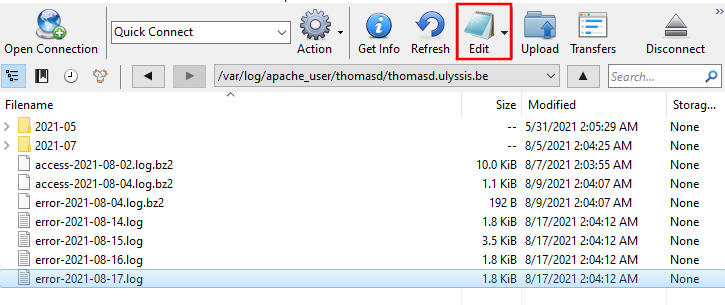Getting Apache logs: Difference between revisions
No edit summary |
|||
| (One intermediate revision by the same user not shown) | |||
| Line 38: | Line 38: | ||
If you can't find your username inside of <code>/var/log/apache_user</code>, don't worry. If you enter it with <code>cd username</code>, it will automatically appear. | If you can't find your username inside of <code>/var/log/apache_user</code>, don't worry. If you enter it with <code>cd username</code>, it will automatically appear. | ||
Older logs will be compressed with bzip2 but can be easily browsed from the command line using <code>bzless</code>. Other tools like <code>bzcat</code> and <code>bzgrep</code> might also come in handy. | |||
[[Category:Webserver]] | [[Category:Webserver]] | ||
Latest revision as of 02:02, 30 December 2024
You can find all your Apache logs (like access.log and error.log) on all of our shell servers in the directory /var/log/apache_user/username. For more information on how to access your files, please visit Accessing your files.
Using Cyberduck (graphical interface)
You can access the log files using an SFTP client like Cyberduck. After logging in to one of our shell servers as per Accessing your files, click on "Go" on the top bar and then click "Go to Folder...":
Then enter /var/log/apache_user/username as path name (replace username with your own username):
After pressing "Go", you will see a directory for each of your websites, containing their Apache logs.
You can view a log file by selecting it and pressing the "Edit" button.
After a few days, logs will be compressed into a bz2 file. You can download such a file and open it with 7-Zip.
Using the command line
You can also access your logs by logging in to one of our shell servers over SSH and navigating to the correct directory:
username@ssh1:~$ cd /var/log/apache_user/username username@ssh1:/var/log/apache_user/username$ ls username.ulyssis.be username@ssh1:/var/log/apache_user/username$ cd username.ulyssis.be username@ssh1:/var/log/apache_user/username/username.ulyssis.be$ ls access-2014-05-07.log error-2014-05-07.log username@ssh1:/var/log/apache_user/username/username.ulyssis.be$ tail error-2014-05-07.log [Wed May 07 01:27:14 2014] [error] [client 10.0.0.1] File does not exist: /home/user/username/www/favicon.ico
If you can't find your username inside of /var/log/apache_user, don't worry. If you enter it with cd username, it will automatically appear.
Older logs will be compressed with bzip2 but can be easily browsed from the command line using bzless. Other tools like bzcat and bzgrep might also come in handy.



